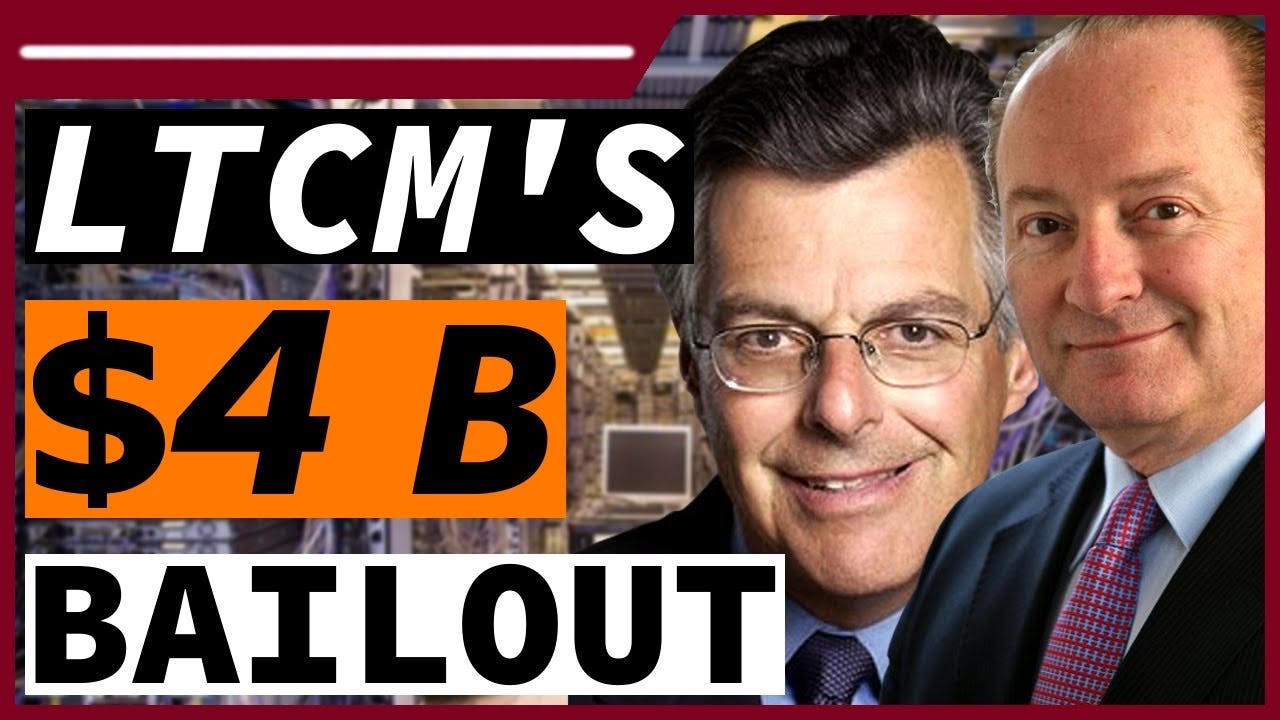🚦 The fall of long-term capital management (1998): A lesson in misreading macro risks
**1/52** Learn from History (Macro Mistakes)
💡 New on Macro Mornings? Start here
🚦 This is part of a 52-week series on Macro Mistakes - Designed for those who want to learn from history.
I share lessons from the biggest macroeconomic mistakes made by investors, companies, and countries, helping you avoid similar pitfalls and capitalize on future opportunities. Feel free to catch up on previous emails here if you'd like to start from the beginning!
Dear all,
Today, I’m excited to launch our new series, "Macro Mistakes", where we’ll explore 52 key moments in financial history where errors were made - errors that could have been avoided by understanding the bigger macroeconomic picture. By learning from these past mistakes, we can better prepare for what lies ahead.
Let’s start with one of the most famous cases: The Fall of Long-Term Capital Management (LTCM) in 1998. This is a story of brilliance, overconfidence, and ultimately, a failure to grasp the power of macroeconomic forces.
✍ The Story
LTCM was a hedge fund managed by a team of financial geniuses, including Nobel laureates. At its peak, the fund controlled $126 billion in assets, despite having only $4.8 billion in equity.
How did they achieve such scale? Through extreme leverage - borrowing money to amplify their bets on small pricing discrepancies in bond markets.
For a few years, the strategy seemed unbeatable. They earned annual returns of 40% in the early years, dazzling investors and Wall Street alike. But success bred overconfidence, and LTCM started taking on even greater risks.
❌🚫 The Macro Mistake
LTCM’s downfall was triggered by a macroeconomic event they hadn't accounted for: the Russian debt default in August 1998.
Russia’s financial collapse sent shockwaves through global markets, but LTCM was so focused on their models that they overlooked the macroeconomic warning signs - rising global risk and the fragility of emerging markets.
What’s critical to understand here is how macroeconomic interdependence works. When one economy - especially a large, interconnected one like Russia - experiences a crisis, it can affect the whole system.
In 1998, investors across the globe pulled money out of risky markets, leading to liquidity crises everywhere. LTCM, with its highly leveraged positions, was caught off guard.
In a matter of weeks, they lost $4.6 billion. Their models, which relied on historical correlations, hadn’t factored in these broader macro trends.
Had LTCM paid attention to macroeconomic signals - such as the growing instability in emerging markets and tightening global liquidity - they might have reduced their exposure. Instead, they were forced into a fire sale of assets, causing even more losses.
👨🎓 The Macro Lesson
This brings us to an important macroeconomic principle: liquidity risk. In times of crisis, access to cash becomes crucial.
LTCM had borrowed heavily, but when markets seized up, they couldn’t unwind their trades without significant losses. It’s a classic example of systemic risk - where the failure of one player or event threatens the entire financial system.
What can we learn from this? Macroeconomics teaches us that markets don’t operate in isolation. The health of one economy affects others, especially in our interconnected world.
By understanding this, you can anticipate risks and seize opportunities. For example, those who understood the macro environment in 1998 would have seen that safe-haven assets like U.S. Treasuries were likely to rise as investors fled risky markets.
Imagine if LTCM had done the same: instead of collapsing, they could have profited from the turmoil by taking positions that benefited from the flight to safety.
That’s the power of having a macroeconomic perspective - you don’t just avoid mistakes, you turn crises into opportunities.
LTCM’s fall is a powerful reminder that even the most sophisticated models are vulnerable to macroeconomic shocks. The lesson for us is clear: we need to keep our eyes on the broader economic forces shaping the markets, not just on the individual trades in front of us.
Alessandro
Founder of Macro Mornings
Discover the Trends That Matter - VIP One-on-One Session for My Insiders
📈 As a valued member of my community, gain exclusive insights and a direct discussion with me to stay ahead of market moves. This is your chance to fully utilize your knowledge!
🏆 Don’t miss this unique opportunity: let’s discuss the latest macro developments and how to leverage them. What does this mean for you? Being part of a select group turning insights into action.
🚀 Don’t miss the chance for tailored guidance. In a dedicated session, we’ll analyze the macroeconomic landscape together, highlighting what really matters for your investment decisions.
📅 Reserve your session here → https://calendar.app.google/DFNQvEkH9C6k8Wfu6
I’M EXCITED TO HAVE YOU ON BOARD, BECOME MY FRIEND
💎 Get your Mentorship FREE here
🎙 PODCAST





